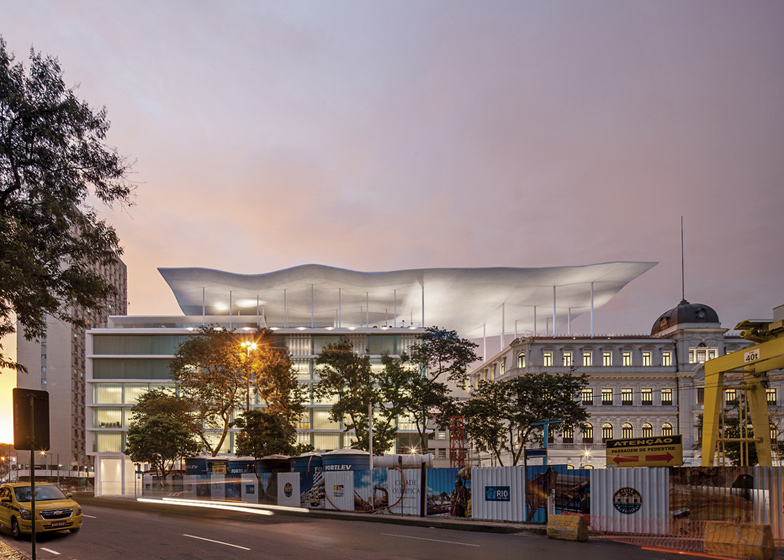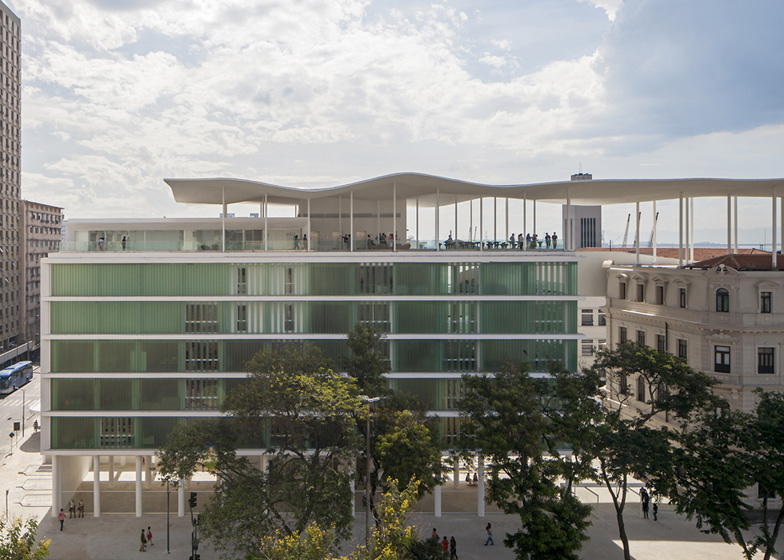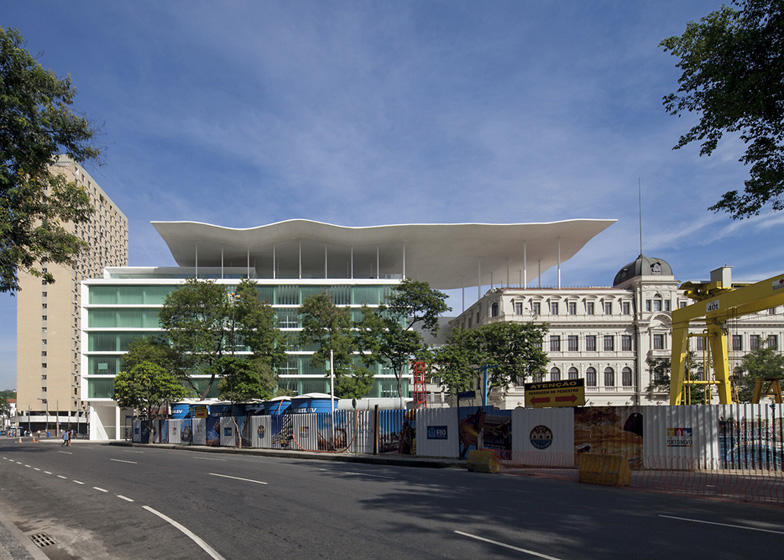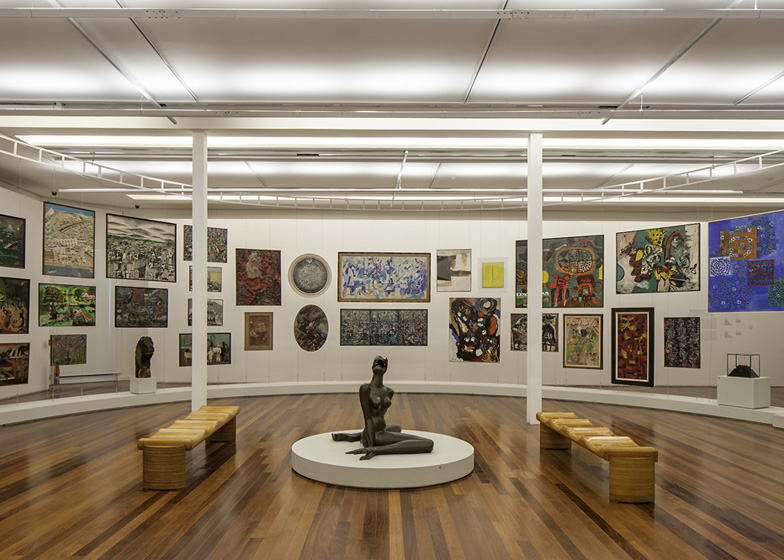With all eyes on Rio ahead of the 2014 World Cup and 2016 Olympic Games, Brazilian firm Bernardes + Jacobsen Arquitetura has grouped three disused buildings under an undulating roof to create a new art museum and art school (+ slideshow + photographs by Leonardo Finotti).
The Museu de Arte do Rio, which opened last month, occupies the renovated interiors of the Palacete Dom João, an early-twentieth-century palace beside Mauá Square in Rio's port. Meanwhile, the Escola do Olhar school is inserted within a former police building and bus station next door.
Inspired by the shape of waves, Bernardes + Jacobsen Arquitetura added an undulating concrete canopy over both of the buildings, sheltering a new outdoor bar and events space on the rooftops.
"We had the challenge of proposing an icon," architect Bernardo Jacobsen told the Rio Times. "The more modern building had two extra floors so we eliminated these to balance the set. Then we built a wave over the two, almost like a flying object."
The museum of art comprises eight double-height galleries, accommodated across four near-identical floors. A ground floor entrance leads in through the centre of the facade, where visitors can either head straight towards the exhibitions or take a lift up to the roof.
The neighbouring school is an elevated structure supported by pilotis. The architects have cleaned up the ground floor area to create a public square, while a small sculpture area is positioned alongside.
Three levels of classrooms, workshops and exhibition rooms begin on the first floor, plus a library and auditorium are located on the fourth floor and a bridge links the two buildings on the next level up.
The Museu de Arte do Rio opened to the public with four eclectic exhibitions of Brazilian and international art.
Above: site plan - click for larger image
The renovated palace won't be the only museum completed ahead of the 2016 Olympic games. The Museum of Image and Sound Rio by Diller Scofidio + Renfro and Casa Daros, a museum of Latin American art, by Paulo Mendes da Rocha are also set to open in the next three years. See more architecture in Brazil on Dezeen.
Above: ground floor plan - click for larger image
See more photography by Leonardo Finotti on Dezeen or on the photographer's website.
Above: mezzanine level - click for larger image
Read on for more project details from Jacobsen Arquitetura:
MAR - Art Museum of Rio
Our challenge was to unite three existing buildings with different architectural characteristics to house the Museu de Arte do Rio, the school "A Escola do Olhar" as well as cultural and leisure spaces. The existing buildings, the palace "Palacete Dom João", the police building and the old central bus station of Rio, connected shall be part of the major urban redevelopment in the historic downtown of Rio de Janeiro. For each construction we analysed different levels of preservation.
Above: first floor plan - click for larger image
The first step was to establish a flow system allowing the Museum and school to work in an integrated and efficient manner. Therefore we proposed the creation of a suspended square on the police building rooftop, which will unite all accesses and host a bar and an area for cultural events and leisure. Consequently, the visitation will be from top to bottom.
Above: second floor plan - click for larger image
It was established that the palace, due to its large ceiling height and structure free plan should hold the exhibition areas of the museum. The police building shall be used for the school, auditoriums, multimedia exhibition areas, administration areas and employee areas of the complex.
Above: third floor plan - click for larger image
The stilts, currently used as an access to the road, will turn into a large foyer for entire complex, and will hold the sculpture exhibition areas. Access will be controlled between the two buildings, characterizing this empty space as internal, open and covered. The marquee of the Road, heritage element listed by the City, will be used for lavatories, store and region of loading, unloading and deposits.
Above: fourth floor plan - click for larger image
The connection and circulation of visitors between the two buildings, in the form of a suspended catwalk will belong to this new building, featuring the most unusual state possible.
Above: fifth floor plan - click for larger image
For the police building, we propose the suspension of the last floor to balance the height of the two buildings as well as the replacement of the masonry closing façade profiles using translucent glass, making the structural system of indented columns visible and revealing the stilts.
Above: sixth floor plan - click for larger image
Finally as the main mark of the project, we suggested that the suspended square have an abstract and aerial form. A fluid and extremely light structure, simulating water surface waves. A poetic architectural character full of meaning, simple and at the same time modern in regards to the structural calculation. This element shall be seen near and by far, and from below to who is arriving at the Praça Mauá, from above by those who are at the Morro da Conceição.
Above: cross-section - click for larger image
Above: elevation - click for larger image




